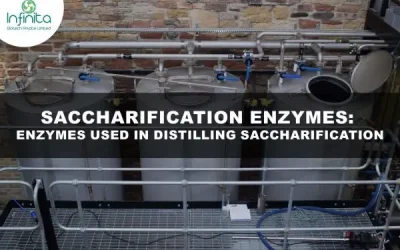Importance Of Enzymes In The Brewing Process
The enzymes in the brewing process can play an important role in enhancing the overall fermentation and brewing process. These are meant to improve the overall taste and also speed up the fermentation process. Enzymes are organic substances complex in nature that are mostly used for speeding up a reaction. However, the enzymes change the entire working and not just the chemical process. They remain unchanged while speeding the complete reaction. Enzymes are meant to promote the hydrolysis of proteins, thereby breaking down the polysaccharides into simple substances which can also be specific. Most of these enzymes act on different substrates, which can be more frequent than others.
The application of enzymes in brewing industry are usually affected by different factors such as moisture, oxygen, pH, and temperature. The increase in temperature can play an important role in affecting the reaction rate, which will further vary depending on the enzyme’s nature. It is extremely necessary to maintain the optimal range for better working.
Many enzymes are promoted during the fermentation stage, depending on the moisture and oxygen content. When enzymes in brewing are implied, the mash content is checked as well. During the germination process, the pH value of substances is thoroughly analysed. Furthermore, calcium is one of the significant elements that help in the a-amylase stabilisation process. If the calcium isn’t added in normal temperature, it can greatly impact the mashing temperature. Enough enzymes must be used in the brewing process. The application of enzymes varies depending on their nature. In most cases, enzymes are added at the beginning of the malting procedure itself.
Importance Of Temperature For Enzymes In The Brewing Industry
When talking about enzymes, most people consider alpha and beta-amylase. Alpha-amylase is one of the most prominent enzymes that is used during the brewing process. It helps to create a soluble, non-fermentable sugar solution which is long and complex. It is further broken down into smaller substances using the beta-amylase enzyme. However, the temperature has a huge impact on the enzymes. The alpha-amylase enzyme is an essential one that works the best under 145-158°F, and the beta-amylase works the best under 131-149°F.
Hence, it is essential to maintain temperature during the brewing process, especially if you are using enzymes. Every enzyme acts depending on its nature and surrounding temperature.
Enzymes Used The Brewing Industry
The comprehensive brewing process is divided into three stages. The first stage is known as malting, in which the enzymes are broken down and synthesised into barley kernel. The endosperm is developed or modified during this stage. The second stage refers to mashing in which the enzyme hydrolyses starch into various fermentable sugars, and the proteins switch into amino acids. The third and the final stage is known as fermentation, in which the yeast ferments sugar to turn them into alcohol. In the brewing industry, unmalted barley grains are used because of the different benefits involved and also because they are extremely affordable. Furthermore, the use of the right enzymes in the brewing industry also helps to enhance energy saving.
Are there any disadvantages of brewing with unmalted barley? Yes. Although brewing with unmalted barley grains can be beneficial, it yields fewer results than the native kernels. The formulation of the unmalted barley includes xylanase, pullulanase, protease, alpha and beta-amylase. Enzyme cocktail ls like Trizyme are used for formulating different enzymes. The enzyme is also used for Mash Tun. These enzymes can play an essential role in producing low carbohydrate beers and high alcohol beers. However, the drawback is that high temperature may lead to the destruction of enzymes, thereby preventing pasteurisation.
What Are The Enzymes In Beer?
Enzymes are proteins that are used in different sectors- ranging from saliva to digestive systems and photosynthesis. Every enzyme is made up of different amino acid chains that can suit up the requirement. However, the reactions would change accordingly. They join the molecules and rearrange them in different ways.
The chemical process of making beer will vary depending on enzymes, substrate concentration and temperature. The enzymes in the brewing industry are used for managing concentration. Depending on the increase in temperature, the enzymes are catalysed as well.
Mashing Enzymes In Brewing Industry
The final malt contains all enzymes required for the conversion process. Homebrewers usually use two types of enzymes for the beer fermentation process- beta-amylase and alpha-amylase.
It is always suggested to maintain the temperature because the higher temperature increases the risk of denaturation process. This eventually will lead to the disappearance of enzymes in five minutes. Exposure to extremely hot temperature can have an impact on the enzymatic activity. Hence, if you are brewing beer at home, you should bring down the temperature as soon as possible.
Beta-amylase is one of those enzymes in brewing that can break down starch and creates soluble sugars. Alpha-amylase is capable of producing small soluble molecules, while beta-amylase can create bigger ones. It helps to create maltose, glucose and maltose. The enzymes in the brewing industry create lighter bodies with high amounts of alcohol. If the temperature increases, the enzymes act fast too. However, these can be easily denatured. It is necessary to maintain the mash temperature and hold it an optimal beta-amylase range. The soluble sugars are maltose and can be beneficial in the fermentation process as well.
The Temperature In The Mash
Mash temperature is extremely beneficial for maintaining fermentability, thereby helping the aroma and flavour of the beer. The malt and beer type eventually will vary depending on the adjuncts and the mash temperature will vary, such as temperature combination and also enhances the brewing process of beer.
Takeaway
The enzymes in the brewing industry can play an essential role in the beer manufacturing process. It is necessary to keep all factors in mind for the brewing process because the excessive temperature can also lead to severe beer wastage. Most of these enzymes are fragile, but they are reusable too. They are the most active at an optimal temperature and pH level. Whether beer is being brewed at home or industry, it is necessary to maintain the scale for extensive results. Hence, before implementing enzymes, it is necessary you know what you want of the mash process.

 Summarize this Article with AI
Summarize this Article with AI






